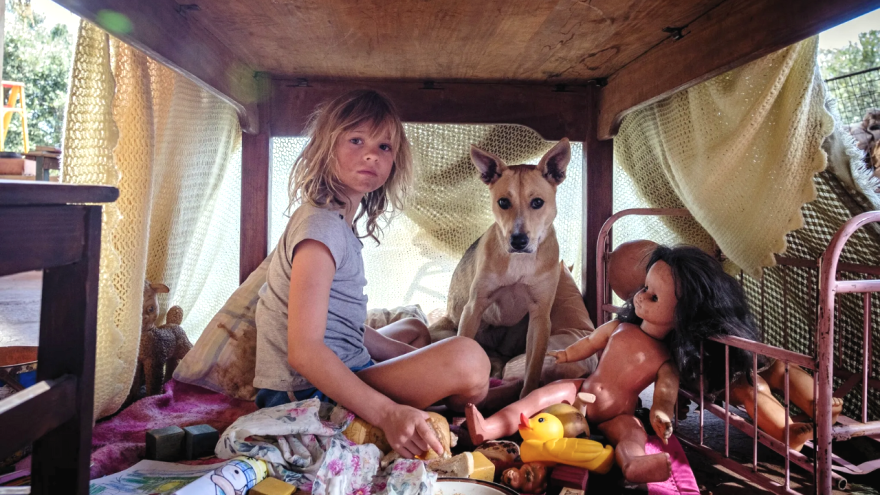DAN WEBSTER:
Over the decades, we’ve seen any number of great screen performances by children. Eleven-year-old Anna Paquin in The Piano. Eight-year-old Tatum O’Neal in Paper Moon. And more recently, a then-6-year-old Brooklyn Prince in Sean Baker’s The Florida Project.
And now we have South Africa’s Lexi Venter, who was just 7 years old during the filming of Embeth Davidtz’s movie Don’t Let’s Go to the Dogs Tonight. An adaptation of Alexandra Fuller’s 2001 memoir of the same title, the film captures the real-life experience of Fuller’s family in 1980, the year that Rhodesia became Zimbabwe, causing many expatriate—mostly white—families to sell their land holdings and leave the country.
The reason for their defection is simple: in the late 19th century, foreign mining interests had founded what came to be known as Rhodesia in territory already home to a number of indigenous groups. For the past decade or more before the Fullers arrived from England to buy a ranch, the country had been subject to attacks from rebel groups emanating from nearby Mozambique.
When Davidtz’s film opens, it’s on the eve of elections that would propell Robert Mugabe to power, first as prime minister and then as president, positions he would end up holding for the next 37 years. His win meant the end of the colonial power structure that had held sway for nearly a century.
Venter plays Bobo, the younger of two daughters to Nicola (played by Davidtz herself) and Tim (played by Rob Van Vuuren). Much of what we learn about the family, and Bobo herself, comes from her inner dialogue.
As she rises in the night to use the bathroom, for example, lighting a candle to show the way, Bobo frets about “terrorists”—a word that needs to be placed within quote marks. She’s afraid to encounter them because she is convinced they were just as likely to impale her with a spear as look at her.
And too, she thinks while riding into town accompanied by an armed convoy, that these same “terrorists” are the cause of all the problems that her family is facing. “Africans turned into terrorists and that’s how the war started,” she says. Which is when the need for quote marks becomes obvious: Bobo’s only repeating what she’s heard her parents and the other white residents spout as they gather on occasion to dance and drink… but mostly the latter.
This is especially true of her mother, Nicola, whose past—and past personal tragedies—Davidtz slowly reveals through occasional quick cuts: to a child in a doorway, a child playing by a pool of water, a flock of chicks scurrying from some disturbance, a woman working desperately over a small, still body.
Whatever the cause of Nicola’s torment, grief over inconsolable loss or the day-to-day struggle to make the ranch a going concern, all is played out against the backdrop of native people encroaching on what the Fullers see as their land.
And if it were only the Fullers themselves whose story Davidtz was telling, her film would be as one-sided as many other Out of Africa-type stories. But Davidtz gives us as well the African couple who work on the ranch, Sarah (played by Zikhona Bali) and Jacob (played by Shilubana N Fumani), who are forced to abide by the family’s dictates while trying to avoid the threats posed by those—the “terrorists,” perhaps, that Bobo fears?—who spy on them from the surrounding hillsides.
It's Bobo’s relationship with Sarah that acts as a counterpoint, and an emotional salve, to what Bobo doesn’t receive from her own mother. And it provides her an alternate view to the racist attitudes she’s been brought up to believe—a view she has trouble understanding but one that she’s likely to ponder further as she matures.
Capturing all of this is no easy task, but especially so for someone standing behind a camera for the first time. Davidtz acquits herself well, though, not just in how she tells Fuller’s story but in how she cast it in the first place.
Her own performance as Nicola is powerful and poignant, but young Venter’s is one for the ages.
For Spokane Public Radio, I’m Dan Webster.
——
Movies 101 host Dan Webster is the senior film critic for Spokane Public Radio and a blogger for Spokesman.com.



